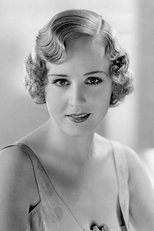Madge Evans
- Child actor
- Teen actor
Lovely Madge Evans was the perennial nice girl in films of the 1930s. By then, she had been in front of the camera for many years, starting with Fairy Soap commercials at the age of two (she sat on a bar of soap holding a bunch of violets with the tag line reading "have you a little fairy in your home?"). 'Baby Madge' also lent her name to a children's hat company. In 1914, aged five, she was picked out by talent scouts to appear in the William Farnum movie The Sign of the Cross (1914), followed by The Seven Sisters (1915) with Marguerite Clark.
By the end of the following year, she had amassed some twenty film credits, appearing with such noted contemporary stars as Pauline Frederick or Alice Brady. All of her early films were made on the East Coast, at studios in Ft.Lee, New Jersey. In 1917 (aged eight), Madge made her Broadway debut in 'Peter Ibbetson' with John Barrymore and Lionel Barrymore. She resumed her stage career in 1926 as an ingenue with 'Daisy Mayme' and the following year appeared with Billie Burke in Noel Coward's costume drama 'The Marquise' (1927).
Her pleasing looks and personality soon attracted the attention of Hollywood and she was eventually signed by MGM in 1931. During the next decade, she appeared in several A-grade productions, notably as Lionel Barrymore's daughter in MGM's Dinner at Eight (1933) and as the dependable Agnes Wickfield in one of the best-ever filmed versions of David Copperfield (1935). She co-starred opposite James Cagney in the gangster movie The Mayor of Hell (1933), Spencer Tracy in The Show-Off (1934) and listened to Bing Crosby crooning the title song in Pennies from Heaven (1936). Madge received praise for her performance as the star of Beauty for Sale (1933) and The New York Times review of January 13 1934 described her acting in Fugitive Lovers (1934) (opposite Robert Montgomery ) as 'spontaneous and captivating'. Many of her 'typical American girl' roles did not allow her to express aspects of the greater acting range she undoubtedly possessed. Too often she was cast as the 'nice girl' - and those rarely make much of a dramatic impact. On the few occasions she was assigned the role of 'other woman' , such as the Helen Hayes-starrer What Every Woman Knows (1934), audiences found her character difficult to believe and disassociate from her all-round wholesome image. When her contract with MGM expired in 1937, Madge wound down her film career and, following her 1939 marriage, concentrated on being the wife of celebrated playwright Sidney Kingsley. She last appeared on stage in one of his plays, "The Patriots", in 1943.
Acted in
Brother, Can You Spare a Dime?
1975
as Self (archive footage)
Hollywood: The Selznick Years
1961
as 'Dinner at Eight' (archive footage) (uncredited)
Matinee Theater
1955
The Alcoa Hour
1955
Hallmark Hall of Fame
1951
Lux Video Theatre
1950
as Sylvia
Your Show of Shows
1950
Studio One
1948
Studio One
1948
as Ann
The Philco Television Playhouse
1948
as Elizabeth Bennet
The Philco Television Playhouse
1948
as Elinor Dashwood
Army Girl
1938
as Julie Armstrong
Sinners in Paradise
1938
as Anne Wesson
The Thirteenth Chair
1937
as Nell O'Neill
Espionage
1937
as Patricia Booth
Pennies from Heaven
1936
as Susan Sprague
Piccadilly Jim
1936
as Ann Chester
Moonlight Murder
1936
as Toni Adams
Exclusive Story
1936
as Ann Devlin
The Tunnel
1935
as Ruth McAllan
Men Without Names
1935
as Helen Sherwood
Calm Yourself
1935
as Rosalind Rockwell
Age of Indiscretion
1935
as Maxine Bennett
David Copperfield
1935
as Agnes Wickfield as a Woman
Helldorado
1935
as Glenda Wynant
What Every Woman Knows
1934
as Lady Sybil Tenterden
Death on the Diamond
1934
as Frances Clark
Paris Interlude
1934
as Julie
Grand Canary
1934
as Lady Mary Fielding
Stand Up and Cheer!
1934
as Mary Adams
The Show-Off
1934
as Amy Fisher Piper
Fugitive Lovers
1934
as Letty Morris
Dinner at Eight
1933
as Paula Jordan
Day of Reckoning
1933
as Dorothy Day
Broadway to Hollywood
1933
as Anne Ainsley
Beauty for Sale
1933
as Letty Lawson
The Mayor of Hell
1933
as Dorothy Griffith
Hell Below
1933
as Joan
The Nuisance
1933
as Dorothy Mason
Made on Broadway
1933
as Claire
Hallelujah, I'm a Bum
1933
as June Marcher
Fast Life
1932
as Shirley
Huddle
1932
as Rosalie
Are You Listening?
1932
as Laura O'Neil
The Greeks Had a Word for Them
1932
as Polaire
Lovers Courageous
1932
as Mary Blayne
West of Broadway
1931
as Anne
Heartbreak
1931
as Countess Vima Walden
Guilty Hands
1931
as Barbara 'Babs' Grant
Sporting Blood
1931
as Miss 'Missy' Ruby
Son of India
1931
as Janice
Envy
1930
as Helen
The Bard of Broadway
1930
Classmates
1924
as Sylvia
On the Banks of the Wabash
1923
as Lisbeth
Three Green Eyes
1919
as Child
Love Net
1918
as Patty Barnes
The Power and the Glory
1918
as Deanie Consadine
Neighbors
1918
as Clarissa Leigh
The Golden Wall
1918
as Madge Lathrop
Stolen Orders
1918
as Ruth Le Page - as a child
True Blue
1918
as Ruth, as a Child
Wanted, A Mother
1918
as Eileen Homer
The Volunteer
1917
as Self
The Burglar
1917
as Editha
The Corner Grocer
1917
as Mary Brian, age 8
Beloved Adventuress
1917
as Francine - Age 7
Maternity
1917
as Constance
The Web of Desire
1917
as Marjorie
The New South
1916
as Georgia Gwynne, as a girl
Seventeen
1916
as Jane Baxter
The Hidden Scar
1916
as Dot
The Revolt
1916
as Nannie Stevens
Husband and Wife
1916
as Bessie
Sudden Riches
1916
as Little Emily
The Devil's Toy
1916
as Betty
The Master Hand
1915
as Jean as a Child
The Seven Sisters
1915
as Clara






































































